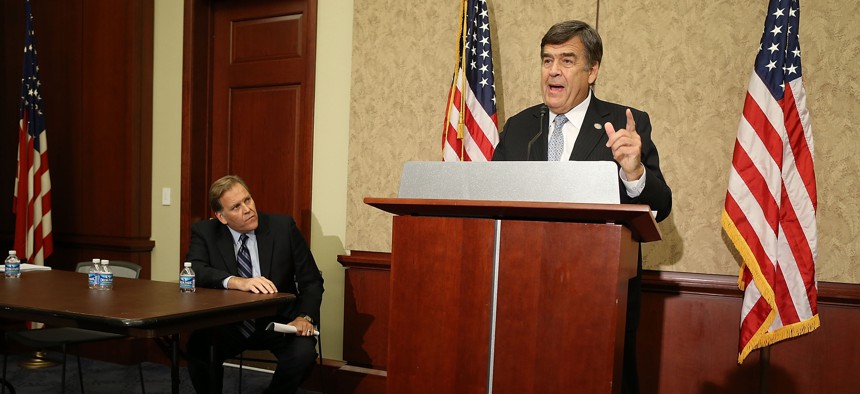Retiring lawmaker Ruppersberger was one of first to sound alarm on Huawei, ZTE in US networks

Rep. Dutch Ruppersberger speaks about a landmark report on potential security threats to U.S. communications infrastructure posed by Chinese telecommunications companies during a news conference on Capitol Hill, October 8, 2012 in Washington, D.C. Ruppersberger was joined by Rep. Mike Rogers, a Michigan Republican who was then chairman of the House Permanent Select Committee on Intelligence. Mark Wilson/Getty Images
The Maryland congressman, who announced he would not seek reelection at the end of his term, set a precedent for modern-day cybersecurity policy.
Longtime Congressman C.A. Dutch Ruppersberger, a Maryland Democrat who announced Friday he would not seek reelection at the end of his current term, was one of the first lawmakers to set a precedent for present-day skepticism of Chinese-made hardware embedded in U.S. networks.
As the leading Democratic member on the House Intelligence Committee from 2011 to 2015, Ruppersberger and his counterpart, former Rep. Mike Rogers, R-Mich., led various early-stage U.S. cybersecurity policy efforts that have become a mainstay over the past decade.
That included a broadside against telecommunications giants Huawei and ZTE, where the duo advised U.S. tech companies to cease doing business with the Chinese vendors, arguing that China-linked access to data-carrying devices and industrial control systems could pave the way for large-scale espionage.
Those vendors are now designated as national security threats by officials, and are barred from selling new equipment in the U.S. Telecom regulators have been taking sweeping steps to eject equipment deemed dangerous to national security through a funding program that would replace potentially dangerous hardware.
“I think that it's not an overstatement to say that Dutch was definitely one of the first members of Congress to sound the alarm on the cyber threat,” Jaime Lennon, his communications director, told Nextgov/FCW in a phone call.
Those cyber legislative efforts continued beyond his time on the House Intelligence Committee, as he introduced bills to address state and local cyber threats and internet-of-things devices. Lennon highlighted a grant program born out of the 2019 Baltimore ransomware attack that cost the city nearly $20 million as one such notable law.
Ruppersberger has also argued the Committee on Foreign Investments in the United States — or CFIUS — should take a significant role in scrutinizing foreign tech investments. The dynamic has become a modern-day staple of technology and security policy as prominent lawmakers have sought to use CFIUS as a way to jettison purportedly dangerous foreign technology products like TikTok from the country.
“There is still so much work left to do in the coming months, from passing responsible budget bills and addressing crime and immigration, to maintaining our national security at a time of extreme global upheaval,” Ruppersberger said in a statement announcing his retirement.



